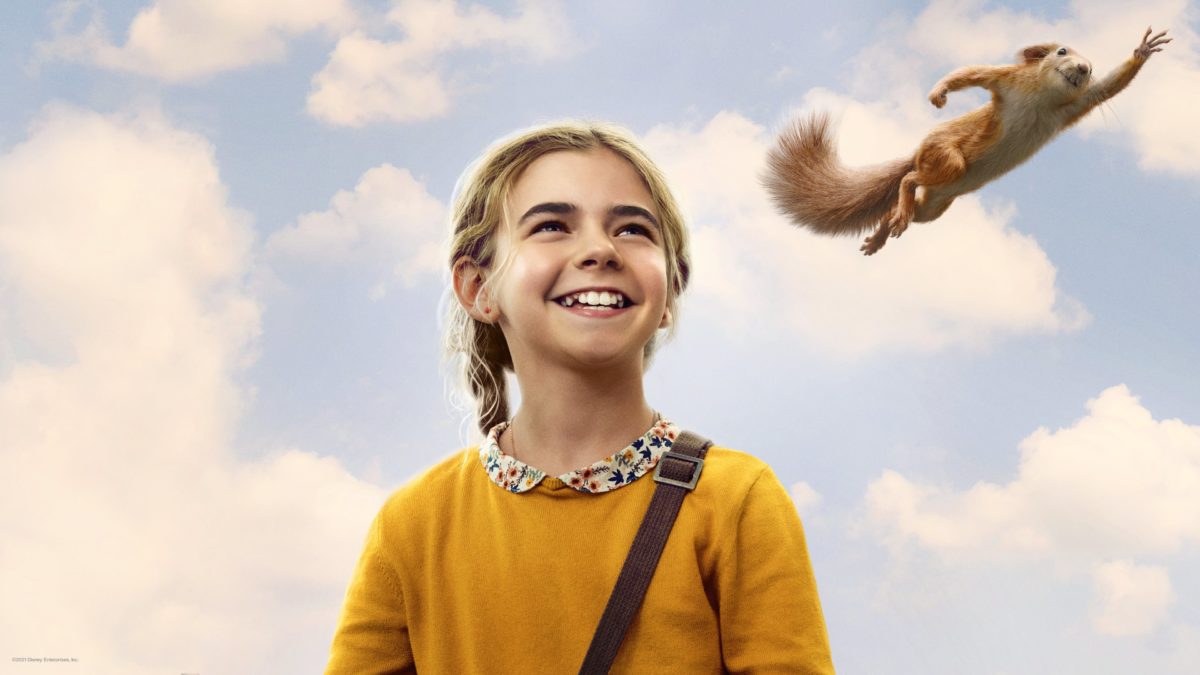Holy unanticipated occurrences!
I really need to stop watching direct-to-streaming adaptations of books I admire. Flora and Ulysses is based off of the quirky, near-masterpiece middle grade novel of the same name by Kate DiCamillo — one of the greatest children’s writers of the past 50 years. The story, in both the movie and the novel, follows pre-teen Flora as she befriends a squirrel with superpowers and encounters an ensemble of colorful friends and neighbors. A lesser writer would have made Ulysses’ powers imaginary and strictly metaphorical; DiCamillo makes them literal without sacrificing any of their literary potency.
As with several of DiCamillo’s books, this one ends with emotional closure moreso than narrative closure, which is all well and dandy in a book. But this kind of quiet ending in which a few small physical actions carry significant weight is a lot tougher to pull off in a movie. And adapting screenwriter Brad Copeland doesn’t even bother trying: the film invents an entire act after the book’s ending, complete with chase scene and unambiguous happily-ever-after. It also introduces a villain totally absent in the book. Whereas DiCamillo is content to have the antagonist be “family strife,” the film introduces a squirrel-hating animal control officer (Danny Pudi).

This isn’t really an apocalyptically-bad adaptation, though. It’s at least smart enough to preserve some of the charming turns of phrase and whimsy of the book. As a comic book satire (the squirrel, Ulysses, is a full-fledged superhero, as well as a cheese puff-loving poet), it has a fairly soft touch, just like the book, which is fine. It evokes and gently subverts superhero tropes without beating us over the head with it. Disney can’t resist the urge to parade some of its intellectual properties around, like Spider-Man and Fantastic Four, but in a way that flows in the story more than, e.g., the lobotomizing anachronism quips in Pinocchio (2022).
It helps that the cast is full of lovable actors. Ben Schwartz as Flora’s father is a particular highlight; he has an affable charm, excellent line delivery, and solid slapstick timing. Cast this man in more stuff, Hollywood. Alyson Hannigan, here playing Flora’s romance novel-writing mother, is always welcome. Pudi is hysterical as he is in pretty much everything. As the title character Flora, Matilda Lawler has sufficient screen presence that I can see her being one of those child actors who keeps showing up in stuff to the point you stop calling them “child” actors, like Hailee Steinfeld.

And I don’t hate the way the movie looks. The CGI squirrel is actually quite attractive, fluid, and well-animated (the CGI cat, less so). The action and slapstick are pretty B-rate aside from some of Schwartz’s fun scenes — e.g. he gets to dance around in an office supply store to “It’s Not Unusual.” In particular, this movie loves the gag of some animal or person smacking against glass and slowly sliding down — I think it uses it three times. But the movie has a distinctive, hazy, over-lit look that actually feels like it’s trying something, which is more than I can say for most streaming fare. At a minimum, it’s highly legible and colorful. I don’t love sophomore director Lena Khan’s shot selection overall — it’s too busy and indirect too often, like she watched Danny Boyle’s movies and learned the wrong lessons. But the film never flies off the rails, and it has mostly pleasant energy.
But it’s just so forgettable and tepid, muddling the book’s wit, which is a shame. I wonder if someone unfamiliar with DiCamillo’s work would be able to pick out her stuff just by trying to pull out the good and memorable lines and bits. I suspect so. So while the adaptation is ultimately inoffensive, that’s such a low bar for the source that I feel pretty sour about it.
Is It Good?
Not Very Good (3/8)
Dan is the founder and head critic of The Goods. Follow Dan on Letterboxd. Join the Discord for updates and discussion.

